Africa Catalyst Phase 2 Programme – Kick-Off Workshop, 9-10 April
My ‘take-away’ from South Africa
Kick-Off Workshop
The Royal Academy of Engineering (RAEng) held a 2-day Kick-Off workshop for Phase 2 of the Africa Catalyst Programme in Johannesburg on 9-10 April 2018. The RAEng invited representatives from the 8 successful bid teams. The SLIE partner team was represented by Trudy Morgan for SLIE, Modupe Williams for Engineers for Change (Sierra Leone) and Peter Fearon from Innovation Action. The Imperial College team could not be represented at the workshop due to prior commitments.
The 2-day workshop included presentations and group discussions around three key subjects:
- Diversity
- Capacity Building
- Inspiring the Next Generation – the SLIE programme was placed under this group
Some of the key messages I took from the presentations and group discussions are outlined here:
Pushing at open doors – a resounding message that came through several presentations was investing time and resources in areas where there was local buy-in with the ability and willingness to grasp the challenge and commitment to deliver the long-term benefits of the programme.
Collaboration and engagement of stakeholders – the importance of collaboration could not be overstated. We were reminded of the African proverb, “if you want to go fast, go alone. If you want to go far, go with others”. I was very encouraged when the Chair of the workshop mentioned that the SLIE programme was an excellent example of collaboration.
Client engagement and the success of Phase 1 –without the great work by Trudy and the team, in both delivering Phase 1 and in keeping the Academy engaged and informed, involvement in Phase 2 may have been less likely for SLIE. If we are to continue to build long-term partnerships, then we should continue to identify creative ways to keep our stakeholders and partners engaged in our programme.
‘Engineers have the skills and ability to improve the lives of people across the world’
David Tomlinson, FRAEng
Strategic alignment of our programme objectives
- The issue of gender diversity is highly important and should be a key consideration in all we seek to achieve.
- It was evident that some of the key features of our programme were well aligned with the emerging ideas around the future of employment and the need to prepare engineers with skills of entrepreneurship and innovation as the concept of a ‘job for life’ was no longer a realistic preposition.
- Making engineering degree courses relevant and benchmarked against international standards was the way of ensuring that graduates were better equipped to compete for high-quality jobs. Many of the new universities being started across Africa do not meet some of the basic standards and were often inadequately resourced.
The strong demand for good quality CPD in Africa could not be underestimated. An image that stuck in my mind was a photograph of students in Nigeria in a packed lecture hall listening to a talk on innovation at a workshop under the ACP2 Programme. The President of the Federation of African Engineering Institutions stated that there is a high demand for CPD across the continent of the right quality and relevance. This fits with our plan for professional engineers from the diaspora delivering structured CPD training programmes. This will enable international standards and local requirements to be met whilst creating an opportunity for self-funded and sustainable programmes.
The importance of engendering the right behaviours was highlighted in some of the presentation and discussions, of leadership, openness and continuous learning. A leader identifies what is required and seeks to deliver the right solution. Programmes should aim to avoid being side-tracked by ineffective bureaucratic practices and focus on delivering tangible outcomes that provide benefits to end users.
Summing up: The RAEng are keen to engage with those projects or programmes that can demonstrate early success. We have 5 key deliverables this year (listed below), let us use this as an opportunity to demonstrate the strong capabilities of our team.
Our key deliverables for 2018 include:
- Delivering Stage 1 of the YEC Programme in Sierra Leone
- Completing a review of the undergraduate degree courses at the University of Sierra Leone
- Delivering an Innovation Workshop in London possibly on 25th October to coincide with a programme of events to commemorate 200 years of the ICE.
- Imperial College team hosting the team of academics from Sierra Leone, possibly in the same week as the Innovation Workshop
- Completing an assessment of the CPD Requirements in Sierra Leone
Some pictures from the event below, a graphic artist was in attendance capturing key points in pictures.

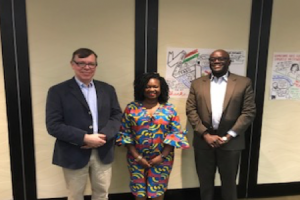
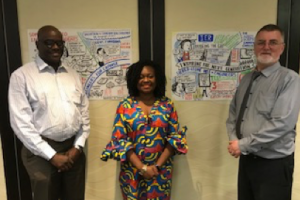
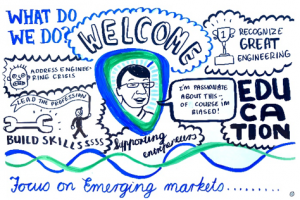
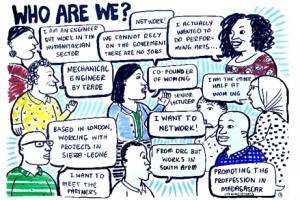
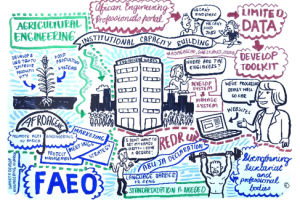
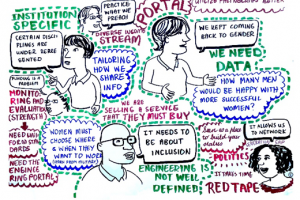
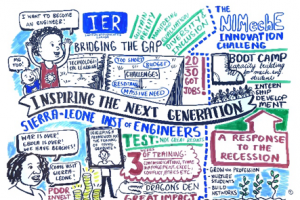
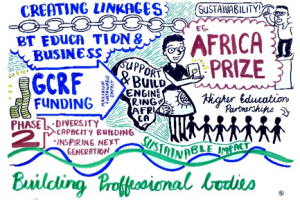
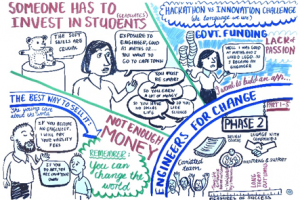
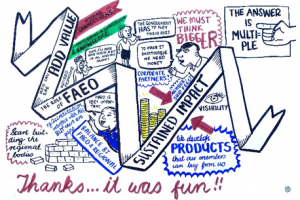
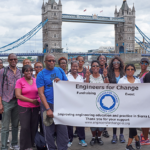 Next Post
Next Post